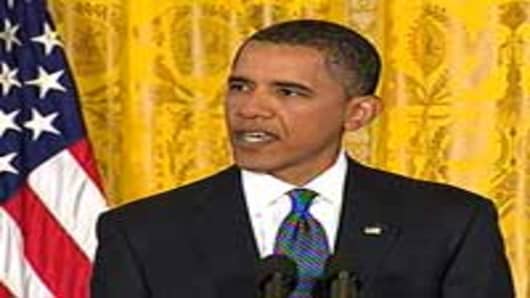But Mr. Bernanke also warned about the dangers of the nation’s fast-growing debt, which will be increased by $4 trillion or more over 10 years as a result of the tax deal being worked out by Republicans and the White House, and said policy makers must start thinking now about the “long-term structural deficit.”
After the failed votes in the Senate on Saturday, top Democratic Congressional leaders met at the White House with Mr. Obama, who told them he would not agree to any deal unless it included the extension of jobless aid, which has begun to run out, and also the extension of a number of tax breaks for middle- and lower-income Americans that were included in last year’s economic stimulus plan.
In a twist on the Republicans’ argument that letting the Bush-era tax cuts expire would amount to a tax increase in a weak economy, Mr. Obama said allowing the stimulus provisions to expire would result in a similar tax increase on working-class Americans who could afford it even less than the high-income people who would benefit from the Republicans’ plan.
The Democratic Congressional leaders attended another strategy session at the residence of Vice President Joseph R. Biden Jr., who has taken a personal hand in the negotiations with Senate Republicans, with whom he has personal relationships from his long tenure as a senator.
Other participants included the Treasury secretary, Timothy F. Geithner, and the budget director, Jacob Lew, who are attending the formal negotiations with Congresson behalf of the White House; the House majority leader, Steny H. Hoyer of Maryland; and Representative Chris Van Hollen of Maryland, who is representing House Democrats in the official talks.
The Senate Republican leader, Mitch McConnell, has made it clear that from the Republican perspective, there is little left to discuss about the tax rates. “Look, this argument is over,” Mr. McConnell said in an appearance on “Meet the Press” on NBC. “The Senate voted yesterday. Every Republican and five Democrats said we’re not raising taxes on anybody in the middle of a recession.” The outcome of those votes was such a foregone conclusion, he said, “It’s almost laughable that we were in session yesterday.”
Still, Mr. McConnell said Republicans were negotiating on several fronts. He said that he understood Mr. Obama would not agree to a permanent extension of the Bush-era tax rates. “Obviously, the president won’t sign a permanent extension,” he said. “So we’re going to have some kind of extension. I’d like one as long as possible.”
And Mr. McConnell acknowledged that there would be a continuation of jobless aid for the long-term unemployed, though he reiterated the Republican contention that the cost should be offset with reductions in spending elsewhere.
“I think we will extend unemployment compensation,” he said. “We’ve had some very vigorous debates in the Senate. Not about whether to do it but whether to pay for it as opposed to adding it to the deficit. All of those discussions are still under way.”
Many Democrats are enraged that Republicans have so far blocked the effort to extend jobless aid, and are insisting on offsetting the cost even as they refuse to offset the lost revenue from the tax cuts.
“They’ve said, ‘No, we are willing to hold that hostage so that we can give the wealthiest people in the country a bonus tax cut,’ ” said Senator John Kerry, Democrat of Massachusetts.


